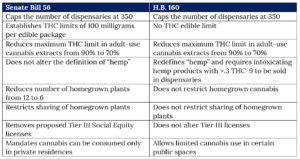Recently, the Ohio Senate passed Senate Bill 56, a piece of legislation that could significantly impact the regulation and operation of medical and recreational cannabis in Ohio. Now, the Ohio House of Representatives has introduced a competing bill rivaling the Senate’s efforts.
The Ohio Senate introduced Senate Bill 56 in January proposing substantial changes to the cannabis laws established by the 2023 Issue 2 ballot measure. In particular, the bill sought to establish certain THC limits and restrict Issue 2’s homegrown provisions.
Shortly thereafter, the Ohio House of Representatives decided to introduce its own competing legislation, H.B. 160. Like Senate Bill 56, H.B. 160 seeks to introduce substantial changes to Ohio’s cannabis system. However, unlike Senate Bill 56, proponents state that H.B. 160 imposes fewer restrictions on consumers.
A summary of both bills and their proposed changes can be found below:

While Senate Bill 56 has passed the Senate and now goes to the House for vote, the newly introduced H.B. 160 must still continue through committee.
The dueling nature of Senate Bill 56 and H.B. 160 demonstrate the Ohio legislature’s competing attempts at cannabis reform. While both bills enact significant changes, Senate Bill 56 has generally been viewed as less consumer-friendly due to its restrictions on homegrown plants and the removal of social equity cultivation licenses. In contrast, H.B. 160 does not set these limitations but does enact significant restrictions on the sale of hemp-derived cannabinoid products.
It is still unclear whether Senate Bill 56 or H.B. 160 is more likely to prevail, and the Ohio legislature may ultimately adopt a compromise bill merging components of both pieces of legislation. Regardless of the form, passage of either Senate Bill 56 or H.B. 160 is sure to have significant repercussions for Ohio’s cannabis market due to both bills capping dispensary licenses and modifying the THC limit for existing products. Operators and vendors in the space should be sure to watch these bills closely and consider the impact they may have on product offerings and business operations.
*Sean Lynskey contributed to this article.
With a practical approach, Chad provides compliance guidance and litigation defense on matters related to cannabis, advertising and marketing, teleservices, and other consumer protection issues.



